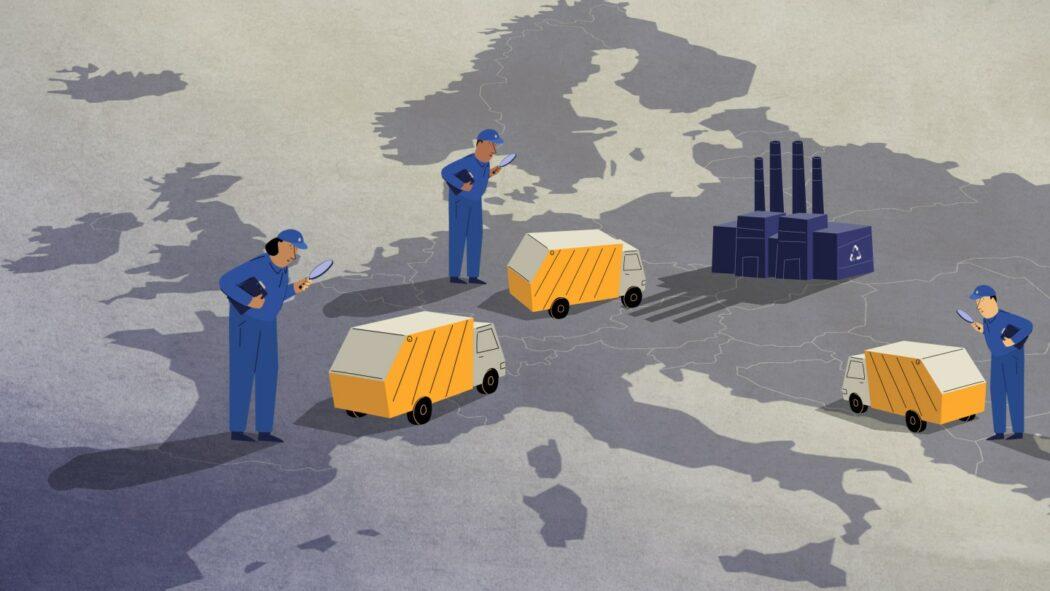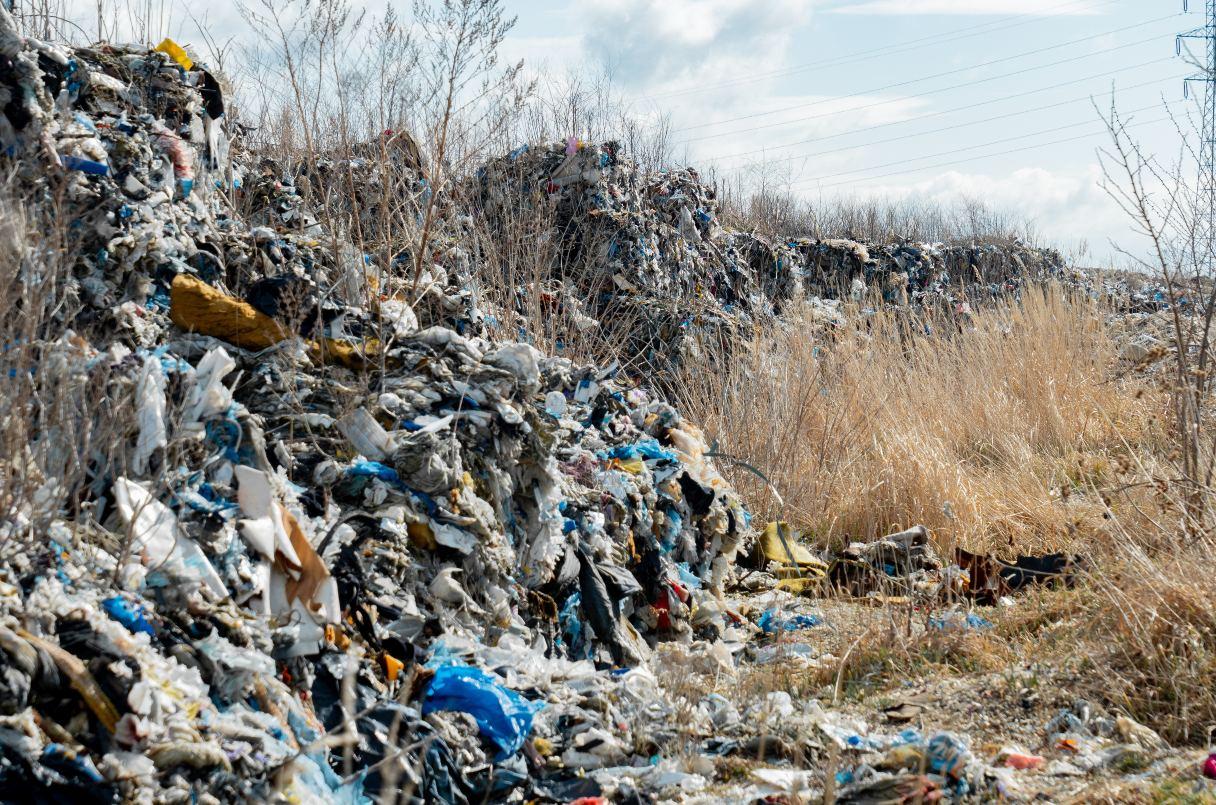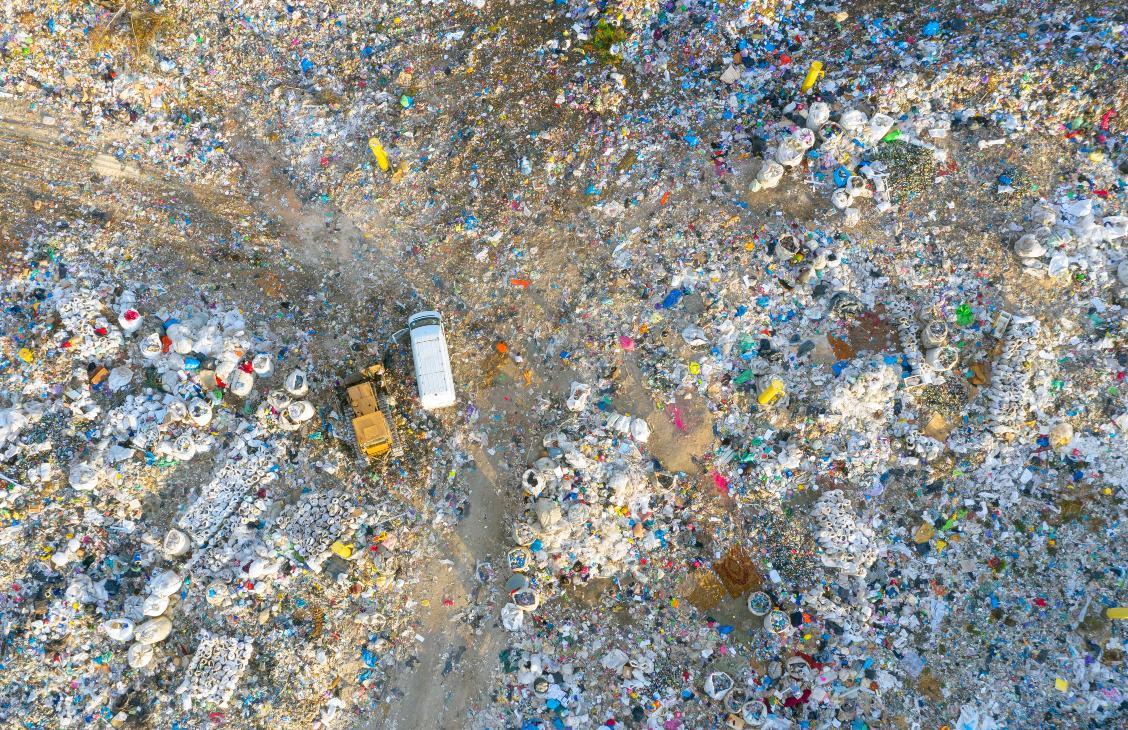Authorities struggle to track Europe’s Illegal waste trade

Alexia Barakou
The volume of plastic waste produced in Europe is mounting and getting rid of it is a costly process. This has created a black market for cheaper solutions but limited resources and ineffective regulation is leaving authorities playing catch up to illegal waste traders.
In the town of Wschowa, not far from the German border, an entrepreneur’s sand mining business caught the attention of authorities after locals complained of rancid smells coming from the fields. Court documents show that Zbigniew T. made his fortune not from selling sand but by burying thousands of tonnes of illegal waste from Germany and western Poland. His profits ran into millions of (untaxed) zlotys.
The sand and gravel holes operated by his firm were several hundred metres deep, and prosecutors allege they were filled with almost half a million cubic metres of waste – enough to fill around 5000 large trucks.
“There are plastics (fragments of film of various sizes), fragments of cheese packaging, caps, empty cosmetics packaging,” said an environmental inspector who took a sample from the subterranean waste dumps. Amid the waste were transportation invoices from a company in Germany showing that it sent plastic mixed with rubble to Poland under the code 170504 – soil and earth.
The case involving Zbigniew T (his full name cannot be used), and 22 others, including an environmental inspector alleged to have cooperated with the gang, is ongoing. Yet it is one of the few that make it to court.
With plastic packaging waste levels increasing – Europeans produced an average of almost 35kg each in 2020, 23 per cent more than in 2010 – and international disposal routes closing, waste-related crime in Europe is a mounting problem. But countries lack the resources to target criminals and EU-wide systems and data collection are often ineffective.
The sand and gravel holes operated by his firm were several hundred metres deep, and prosecutors allege they were filled with almost half a million cubic metres of waste – enough to fill around 5000 large trucks.
“There are plastics (fragments of film of various sizes), fragments of cheese packaging, caps, empty cosmetics packaging,” said an environmental inspector who took a sample from the subterranean waste dumps. Amid the waste were transportation invoices from a company in Germany showing that it sent plastic mixed with rubble to Poland under the code 170504 – soil and earth.
The case involving Zbigniew T (his full name cannot be used), and 22 others, including an environmental inspector alleged to have cooperated with the gang, is ongoing. Yet it is one of the few that make it to court.
With plastic packaging waste levels increasing – Europeans produced an average of almost 35kg each in 2020, 23 per cent more than in 2010 – and international disposal routes closing, waste-related crime in Europe is a mounting problem. But countries lack the resources to target criminals and EU-wide systems and data collection are often ineffective.
Mounting problems
The price paid per tonne of illegal waste by those who want to get rid of it in western Europe, fluctuates between €30 and €50 in Poland. That is far cheaper than pursuing legitimate routes to recycling facilities in Germany, which could cost €300 per tonne. Dumping waste in a landfill in the UK can cost €113 per tonne, more than double that in Poland, Romania, Bulgaria or Croatia where illegal sites are rife. Italy and the UK have both recently been forced to take back rubbish found on illegal sites in Poland, the German firm implicated in the Zbigniew T. case, however, has remained free from such demands.
An illegal plastic waste dump site in Poland.Shutterstock
Between 2017 and 2018, eastern Europe became a hotspot for illegal waste dumping – in many cases literally. More than 130 landfills burned in Poland in 2018 alone. To date, across Poland, fewer than 10 people have been convicted of arson.
“It all started in 2018 when China closed its market. Then other countries, Malaysia and the Philippines, Poland, Slovakia, Romania, Tunisia, Turkey, Morocco and Egypt were suddenly put under pressure to accept more waste,” says Piotr Barczak, a circular economy expert at Poland’s Zero Waste Association.
Publicly, Polish authorities boast that hundreds of waste shipment inspections are made each year. But only a fraction make it to court. Environmental inspectors in Warsaw or those in Lisbon or Athens are clear as to why this is: prosecutors don’t like waste cases. Cases are arduous, resources limited and convictions rare. Maximum prison terms across Europe rarely exceed five years. The maximum in Spain is two years. Slovenia has some of the harshest laws, with smuggling and illegal waste dumping punishable by up to 12 years in prison.
“European legislation on environmental offences – and also on plastic waste – is very lenient for offenders,” says Maurer, who retired last year. “The law sees offenders as ‘economic actors’. Environmental offences are seen as minor, admittedly in an obvious way. In most cases, cases against them do not stand up in court because the law makes it difficult to prove offences.”
Barczak agrees: “The worst thing is that there are small penalties for these waste crimes. Now the Polish ministry is promising 10 years in prison for illegal waste transport – but the penalties will not dissuade criminals from acting.”
The tame impact of legislation is outlined in EU Commission’s staff working document. It offers a damning assessment of the effectiveness of the current Waste Shipment Regulation:
Only 22 people are employed in Poland’s cross-border waste shipment department. Spain’s Ministry of Ecological Transition and Demographic Challenges (MITECO) has six employees focused on the issues. In Norway, the Environment Directorate has four staff working on waste export certificates and 30 as inspectors, tasked with overseeing nine laws with a total of 22 regulations. Eighteen staff are responsible for monitoring France’s waste shipments.
“It all started in 2018 when China closed its market. Then other countries, Malaysia and the Philippines, Poland, Slovakia, Romania, Tunisia, Turkey, Morocco and Egypt were suddenly put under pressure to accept more waste,” says Piotr Barczak, a circular economy expert at Poland’s Zero Waste Association.
Publicly, Polish authorities boast that hundreds of waste shipment inspections are made each year. But only a fraction make it to court. Environmental inspectors in Warsaw or those in Lisbon or Athens are clear as to why this is: prosecutors don’t like waste cases. Cases are arduous, resources limited and convictions rare. Maximum prison terms across Europe rarely exceed five years. The maximum in Spain is two years. Slovenia has some of the harshest laws, with smuggling and illegal waste dumping punishable by up to 12 years in prison.
Limp Brussels legislation
Europe’s inability to tackle the illegal waste trade is in part due to incoherent legislation agreed in Brussels. Helmut Maurer, a former senior expert in the European Commission’s directorate for circular economy who spent decades working on waste issues, says EU laws are too lenient.“European legislation on environmental offences – and also on plastic waste – is very lenient for offenders,” says Maurer, who retired last year. “The law sees offenders as ‘economic actors’. Environmental offences are seen as minor, admittedly in an obvious way. In most cases, cases against them do not stand up in court because the law makes it difficult to prove offences.”
Barczak agrees: “The worst thing is that there are small penalties for these waste crimes. Now the Polish ministry is promising 10 years in prison for illegal waste transport – but the penalties will not dissuade criminals from acting.”
The tame impact of legislation is outlined in EU Commission’s staff working document. It offers a damning assessment of the effectiveness of the current Waste Shipment Regulation:
- lack of reliable data
- discrepancies in waste classification between Member States;
- discrepancies in the interpretation of the legislation by Member States;
- Lack of sanctions and enforcement in general;
- lack of trained people;
- lack of cooperation between Member States;
- lack of human and financial resources in the European Commission;
- costs and bureaucracy can encourage illegal shipments.
Staff shortages
Only 22 people are employed in Poland’s cross-border waste shipment department. Spain’s Ministry of Ecological Transition and Demographic Challenges (MITECO) has six employees focused on the issues. In Norway, the Environment Directorate has four staff working on waste export certificates and 30 as inspectors, tasked with overseeing nine laws with a total of 22 regulations. Eighteen staff are responsible for monitoring France’s waste shipments.

Europe’s plastic waste production increased more than 20 per cent between 2010 and 2020.Shutterstock
Portugal’s Inspectorate General covers environmental crimes, but also agriculture, maritime and land management. A result of a European Commission (together with the IMF and ECB) review of the country’s ‘financial rescue’ after the 2011 debt crisis when several inspection bodies were merged. Now only 30 inspectors work on environmental topics. Salaries are low, too, compared to other civil servants. Senior officials in Portugal earn less than €3800 per month. The same problem exists in Poland, where inspectors are leaving for better paid jobs in the private sector.
“Staff shortages are a general and widespread problem. We do not have enough people to carry out more quantitative and qualitative inspections,” the IMPEL official says.
Several institutions are often responsible for monitoring waste shipments at the same time (environmental inspectors, police, tax officials and customs and transport authorities). A 2020 Interpol report warned that “due to limitations in investigative powers, investigations of waste crimes may be dispersed among different authorities”.
“Staff shortages are a general and widespread problem. We do not have enough people to carry out more quantitative and qualitative inspections,” the IMPEL official says.
Fragmented actions
Qualitative inspections are made more difficult as most waste trading relies on paper documents. There is no single electronic waste database for Europe and some countries still do not publish their waste management permit registers.Several institutions are often responsible for monitoring waste shipments at the same time (environmental inspectors, police, tax officials and customs and transport authorities). A 2020 Interpol report warned that “due to limitations in investigative powers, investigations of waste crimes may be dispersed among different authorities”.
Communication between EU countries on waste is not easy, as there is no common system to cross-analyse data from several countries. The UK uses a system called IWS Online to control waste shipments, while Spain’s MITECO (like Poland) has a system linked to customs, as does Portugal. “The lack of international traceability hinders efforts to identify the source, recipient and other investigative leads,” the Interpol reported added.
To improve this, the EU has created IMSOC, a system for managing information from official inspections. It already contains databases on unsafe food and feed and animal diseases. But the introduction of an IMSOC system for waste control is going slowly – currently only 32 out of 148 countries use it. The use of the system is not mandatory but will become so after the introduction of the new EU Waste Shipment Regulation (WSR).
Since 2016, the EU has funded at least three projects to combat the illegal movement of waste. They are largely a collection of training toolkits, regulatory information and current illegal waste trends. The Shipment of Waste Enforcement Actions Project could provide inspectors with valuable digital support, however, as it plans to launch a GPS-based waste tracking tool.
“So far we have developed a manual for authorities on how to use the trackers, and for some countries we have ordered and delivered trackers,” a spokesperson says. “They have not been employed yet, so we have no results at the moment.”
The new improved WSR has been on the legislative table since December 2022. It could enter into force in early 2025 with stronger penalties expected and measures to address the differences in interpretation and implementation across Europe.
For environmental inspectors on the ground in Poland, however, tracking down illegal waste operations remains a challenge. “Sometimes we are called the environmental police,” one unnamed inspector says. “But we are an administrative body, we conduct administrative proceedings, not investigations. The first thing we hear from lawyers of the inspected companies is that we didn’t have enough grounds to come to the inspection. If it proves that we abused our powers, all our findings are invalid. The regulations are weak.”
Editor: Chris Matthews
This Investigation is supported by Journalism Fund Europe’s Earth Investigations programme.
To improve this, the EU has created IMSOC, a system for managing information from official inspections. It already contains databases on unsafe food and feed and animal diseases. But the introduction of an IMSOC system for waste control is going slowly – currently only 32 out of 148 countries use it. The use of the system is not mandatory but will become so after the introduction of the new EU Waste Shipment Regulation (WSR).
Can Europe catch up with the criminals?
The European Commission states that “divergent control/inspection systems and the lack of harmonised inspection criteria, in particular the frequency and quality of inspections, undermine uniform enforcement of the WSR” indicating that “one of the main reasons for the persistence of illegal waste shipments is the lack of uniform enforcement across the EU”.Since 2016, the EU has funded at least three projects to combat the illegal movement of waste. They are largely a collection of training toolkits, regulatory information and current illegal waste trends. The Shipment of Waste Enforcement Actions Project could provide inspectors with valuable digital support, however, as it plans to launch a GPS-based waste tracking tool.
“So far we have developed a manual for authorities on how to use the trackers, and for some countries we have ordered and delivered trackers,” a spokesperson says. “They have not been employed yet, so we have no results at the moment.”
The new improved WSR has been on the legislative table since December 2022. It could enter into force in early 2025 with stronger penalties expected and measures to address the differences in interpretation and implementation across Europe.
For environmental inspectors on the ground in Poland, however, tracking down illegal waste operations remains a challenge. “Sometimes we are called the environmental police,” one unnamed inspector says. “But we are an administrative body, we conduct administrative proceedings, not investigations. The first thing we hear from lawyers of the inspected companies is that we didn’t have enough grounds to come to the inspection. If it proves that we abused our powers, all our findings are invalid. The regulations are weak.”
Editor: Chris Matthews
This Investigation is supported by Journalism Fund Europe’s Earth Investigations programme.

